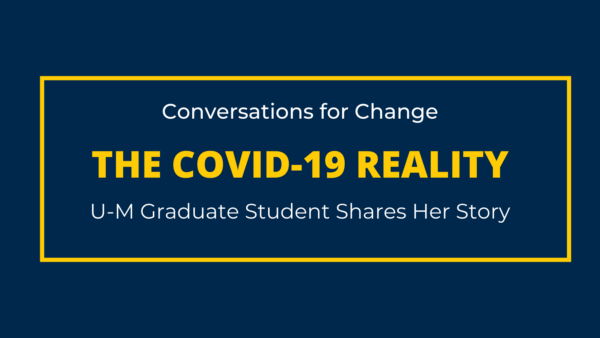As the coronavirus continues to spread across the nation, headlines continue to highlight the immense impact and severity of the pandemic across society, enabling some to feel distanced or disconnected from the role COVID-19 is playing within our own communities, families, and campus. Misconceptions, pending research, and conflicting online narratives regarding symptoms, illness severity, and long-term consequences, have created inconsistencies in the adoption of public health guidelines and recommended behaviors.
“Leaders often highlight public health risks while communicating to young people about recommended pandemic response. This strategy relies on the argument that for young people, following these recommendations is really to protect older and more vulnerable populations as well as essential workers” and while these are undeniably important reasons to follow guidelines, one U-M graduate student has noticed that the impacts of COVID-19 on young people, directly, tend to be missing from the conversation. In a recent interview, they shared their experience in hopes of further educating the U-M community, and beyond, regarding the potentially unforeseen and lasting effects of the virus.
“The health outcomes from COVID-19 are often publicized as either asymptomatic and/or a mild cold, or death, with no in-between. However, as we learn more about this novel virus, it is becoming clear that some people, including many young people, experience debilitating illness that becomes chronic (defined as lasting more than 6 months).
I am one of those people.
In mid-March, I developed cold-like symptoms that just got worse and worse. I had trouble breathing, trouble thinking, crushing chest pain that woke me up at night, and recurrent fevers amongst an onslaught of other troubling and at times terrifying symptoms. Upon consultation with my doctor, I was informed my experience was considered “mild” COVID-19 according to the Center Disease Control (CDC) and other public health guidelines, because I did not require admittance to a hospital and/or supplemental oxygen.
And yet, despite its mild classification, eight months later, I am still struggling to return to ‘normal’ and having trouble obtaining a treatment plan. The newness of the COVID-19 virus also means that I do not know how long this will all last or if it will be forever. My former lifestyle, which included regular endurance activities, seems like a lifetime away.
Of course, not everyone who gets mild COVID-19 gets as sick as I did. As you’ve no doubt heard many times, there are an array of things we do not know about this disease and how it impacts one person to the next. While we can consider things such as age, pre-existing conditions, risk tolerances and infectious load, it is not possible to predict how any given person’s immune system will respond.
I definitely did not expect this, and I am far from the only person in this position. And so, along with the message that young people should consider other members of the public when making decisions during this difficult, isolating time, it is important for young people to understand that there are potential long-term health impacts on themselves.
I really implore people to be kind to each other regardless of what perceptions you have of someone else. This has been a really hard time for everybody, for very different reasons sometimes.”



